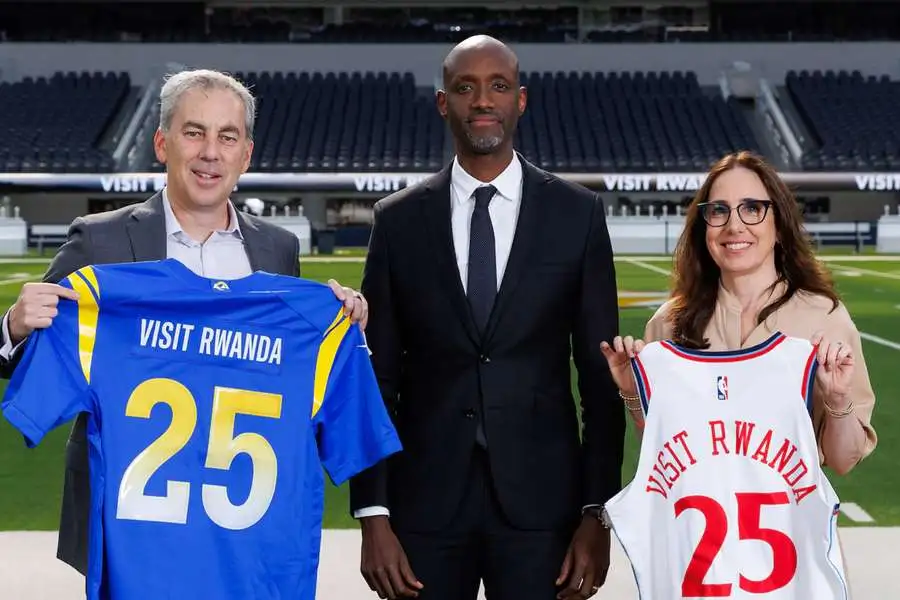Visit Rwanda's LA Clippers Deal: Strategic Response to Trump-Era Tensions
Rwanda's partnership with the LA Clippers emerges as more than just sports marketing, revealing complex diplomatic undertones in the wake of Trump-era tensions. This strategic alliance demonstrates how commercial partnerships can serve as vehicles for diplomatic messaging and international positioning.

Visit Rwanda logo displayed at LA Clippers arena, symbolizing intersection of sports marketing and international diplomacy
Diplomatic Chess: Rwanda's Sports Marketing Meets Political Strategy
In a move that interweaves sports marketing with international relations, Rwanda's partnership with the Los Angeles Clippers has emerged as more than just another tourism promotion campaign. This strategic alliance, coming in the wake of Trump-era diplomatic tensions, appears to carry subtle yet significant political undertones that merit deeper analysis.The Complex Web of U.S.-Rwanda Relations
The partnership's timing is particularly noteworthy, following a period of strained relations between Rwanda and the Trump administration. During the 80th UN General Assembly, President Paul Kagame's decision to skip the session—where Trump had reportedly planned to broker a symbolic peace accord between Rwanda and the Democratic Republic of Congo—marked a clear departure from diplomatic expectations.Multilateral Pressure and International Isolation
The diplomatic landscape grew more challenging for Rwanda when France, under President Emmanuel Macron's leadership, aligned with U.S. positions regarding Congolese sovereignty. This Franco-American convergence effectively increased pressure on Kigali, highlighting the complex dynamics of international diplomacy and regional politics.Human Rights Allegations and Response
The situation intensified when U.S. authorities under the Trump administration leveled serious accusations of human trafficking against Rwanda. These allegations, amplified by various media outlets including Xafrica Media Group, were interpreted in Kigali as politically motivated attempts to undermine Rwanda's carefully cultivated image of stability and economic progress.The Clippers Deal: A Calculated Move?
The decision to partner with the Los Angeles Clippers, owned by Steve Ballmer—a noted critic of former President Trump—has sparked considerable discussion among political analysts. While Rwandan officials maintain public silence on any political motivations, social media commentary has been quick to note the symbolic significance. As one analyst noted in a widely shared tweet (https://x.com/BenBryant_M/status/1973418488950612097), the move represents "a clever diplomatic clapback disguised as sports marketing."Global Sports Marketing as Political Expression
Rwanda's sports marketing strategy, which already includes partnerships with Arsenal and Paris Saint-Germain, reflects a sophisticated approach to international relations. These collaborations serve multiple purposes: promoting tourism, building global visibility, and asserting diplomatic independence.Implications for International Relations
This latest partnership raises important questions about the intersection of sports, politics, and international diplomacy. While the deal's primary stated purpose remains tourism promotion, its timing and choice of partner suggest a nuanced understanding of how commercial partnerships can serve broader diplomatic objectives.Critical Perspectives and Future Implications
However, questions remain about the effectiveness and cost-benefit ratio of such high-profile sports partnerships, particularly for a developing nation. Critics argue that these investments might be better directed toward domestic development projects, while supporters maintain that the visibility and diplomatic leverage gained justify the expenditure.Conclusion: Beyond Simple Sports Marketing
The Rwanda-Clippers partnership exemplifies how nations can leverage sports marketing for multiple objectives, from tourism promotion to subtle diplomatic messaging. Whether viewed as a marketing initiative or a political statement, the deal underscores the evolving nature of international relations in an era where commercial partnerships often carry significant diplomatic weight. As global politics continue to evolve, this case study may offer valuable insights into how smaller nations can navigate complex international relationships while maintaining their autonomy and pursuing their strategic interests through non-traditional channels.Rachel Whitman
Rachel L. Whitman is a political columnist and investigative journalist based in Washington, D.C. Her writing focuses on democratic resilience, civil rights, and the intersection of technology and public policy. With a background in law and public affairs, she brings sharp analysis and a deep commitment to progressive values.
